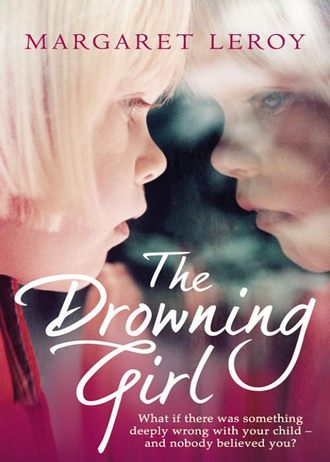
Полная версия
The Drowning Girl
‘I don’t think she sees me like that,’ I say.
But I know he isn’t listening: I know he’s sure he has found the key to decoding our relationship.
‘Over-involvement can be a danger for single mothers,’ he says. ‘Perhaps especially with a daughter, and when you have only one child. Sometimes the mother will see the child almost as part of herself, and that’s terribly unhealthy for the child. You need to maintain that boundary. It’s crucial for Sylvie’s mental health. I’d really like to see her calling you Mum.’
I don’t say anything.
His glance flicks down to his wristwatch. I know the consultation is coming to an end. Despair drags at me. If he can’t help me, who will?
‘Now, unless there’s anything else you need to ask…’ he says.
In the playroom, Sylvie is trying on dressing-up hats and laughing. I feel a stupid anger with her, for behaving so perfectly. I’m willing her to scream, to do something unnerving or strange; but she pulls on a hat with a feather and grins at her reflection in the mirror. Two minutes and it’ll be over, and my chance to get help will be gone.
I clear my throat, but I’m not looking at him.
‘I read something in a newspaper—about children with problems like Sylvie’s…’ My mouth feels thick and dry. I hadn’t planned to say this, but I don’t know what else I can do. ‘It said that some psychiatrists will do regression to try and help the child—you know, hypnotise them… Take them back…’ My voice fades.
His face tenses, sharpens a little. I feel it’s the first time I’ve really got his attention. I don’t know if this is a good thing.
‘Correct me if I’m wrong,’ he says, ‘but I think you must be referring to the past-life lobby.’
‘Well. Kind of.’
My voice is thin and high.
He screws up his mouth, as though he has a bitter taste.
‘I’m afraid it’s true, there are such people,’ he says. ‘Sadly even the medical profession does have its lunatic fringe.’
‘I thought I’d just mention it…’
I look out into the gardens, at the lawns, at the great swaying cedars. I would like to be out there, to feel the cool air on my skin.
‘Ms Reynolds.’ He picks up his silver pen, leans forward; he’s brisker suddenly, more formal, an edge of concern in his voice. ‘Do you have a particular interest in these kinds of things, would you say?’
‘Not really. It was just that the little boy in the article sounded so like Sylvie…’
He coughs slightly.
‘What I’m trying to get at, Ms Reynolds—could you tell me, have you ever experienced anything that would incline you to believe in the paranormal?’ His words are measured, careful.
I don’t see why he’s asking this.
‘What kind of thing?’ I ask him.
‘Sometimes people can hear things—voices in their heads that sound like other people. Is that something you’ve ever experienced?’
Shit.
‘No. Nothing like that,’ I tell him.
‘Any hallucinations at all? Seeing things that aren’t there?’
‘No. Never.’
‘And in your family? Mother, father, grandparents—any problems with mental illness or anything like that?’
‘No. My mother wasn’t a very happy person—but no, nothing like that.’
‘And her father’s family? What about them?’
‘I don’t really know,’ I tell him. ‘It wasn’t that kind of relationship. To be honest, I don’t know anything about them…’
My voice fades. I feel a brief hot shame.
He nods, as though this is what he expected.
‘I also have to ask you this—for Sylvie’s sake, you understand. Are you—or have you ever been—a user of illicit substances? Cannabis? Amphetamines?’
I shake my head. Though I did once eat some hash brownies at a party at Lavinia’s—she grows cannabis plants in her window boxes; we had a riotous evening but afterwards I was sick.
‘Right, then.’ He permits himself a little quiet sigh. ‘Look, I really don’t think we need to invoke the paranormal to understand your daughter. The truth is, sometimes it’s easier to embrace some extravagant theory, than to examine our own behaviour,’ he says.
‘I just thought I’d mention it,’ I tell him. I can’t believe how stupid I’ve been.
He leans back in his chair again.
‘So there you have it, Ms Reynolds. Sylvie has a phobic disorder and some slight impairment of social functioning, probably exacerbated by rather weak boundary-setting. I can see, of course, that you find her behaviours difficult. But I really don’t feel she falls within our remit.’
I swallow hard.
‘So you can’t help us,’ I say.
He frowns. Perhaps I put it too baldly.
‘I didn’t say that exactly, Ms Reynolds. But sometimes the best way in isn’t via the presenting problem. Sometimes we need to intervene in a different part of the family system. And I do feel that there are issues here about boundaries and over-involvement, and also some unresolved anger about Sylvie’s father and how he treated you. And what I think we should do here is to focus on you, rather than Sylvie. To assist you with boundary-setting, and to help you handle Sylvie’s behaviours,’ he says.
There’s a weight like lead in my stomach.
‘I have an excellent colleague, Dr Jenny Martin,’ he says, ‘who I’m sure would be able to help. She’s really very approachable. If you’re happy with that, then I’ll fax her my notes, and you can ring for an appointment.’
He gives me Dr Martin’s number, and takes me through to find Sylvie. She says goodbye to Katy and slips her hand in mine. She looks up at me with a little pleased smile, perhaps expecting praise for her immaculate behaviour.
We walk slowly out through the grounds of the clinic. The boughs of the cedars creak as they move with a strange high sound like a human voice.
‘It was nice there,’ says Sylvie. ‘I liked the cooker, Grace. The cooker was nice, wasn’t it?’
I feel despair. All that effort—the time off, the planning what to say, Sylvie’s boots I could barely afford—and all for nothing.
‘I knew you’d like the cooker. It’s just the same as the one in Lennie’s bedroom,’ I say.
‘She isn’t Lennie,’ says Sylvie.
I don’t say anything.
CHAPTER 12
One Saturday, when Leo and Josh have gone sailing, we take the girls to the zoo. It’s a beautiful afternoon—pellucid sunlight, razor-sharp shadows, a keen chill out of the sun. We buy ice creams, though really it’s too cold for them. The girls run on ahead of us.
‘Sylvie seems great today,’ says Karen.
‘Yes. I hope so.’
I tell her about Dr Strickland, about being referred for counselling myself: Karen listens intently.
‘Don’t just dismiss it, Grace,’ she tells me, when I’ve finished. ‘Maybe it would be good for you to see someone on your own. You’ve been under such a lot of stress. You never know, it might be useful.’
‘But it isn’t my problem, it’s Sylvie’s.’
‘I know that’s how it must seem. But problems aren’t always all that clear-cut, in families,’ she tells me.
The girls have finished their ices and come to drop their cones in the bin. Sylvie gives me a quick, light hug. I bend to her and she kisses me with sticky scented lips. I bury my face in her hair; the sun has brought out its musk.
‘You smell of the sun,’ I tell her.
‘Really, Grace. How can I smell of the sun?’ she says. ‘Really.’
It’s her sensible voice, showing she knows how the world works. She rushes off, laughing, with Lennie.
We pass the gibbon enclosure, where the fence throws a crisp black patterning over the grass, an immaculate shadowy stencilling. The girls make monkey faces and pretend to hunt for fleas in one another’s clothes. We’re walking straight into the sun, which is sinking already, red as flame and dazzling; it hurts our eyes to look at it. We pass the tigers, two great animals sprawled in a pool of florid light, their bright coats rippling with their lazy, sleepy breath. We come to the llamas and camels.
‘I really love camels,’ says Karen. ‘They’re funny. I love their snooty expressions. You look at all these animals, and you’ve got to think God really had some very odd ideas.’
On impulse, I turn to her.
‘Karen, d’you believe in reincarnation?’
She grins. ‘Coming back as a monkey and all that?’
There’s a red glaze on my vision, the after-image of the sun.
‘Well, yes. Or as another person…’
‘Tell you what,’ she says. ‘I’ve always thought I’d like to come back as a cat. Ideally an indolent pedigree cat with a truly besotted owner. Lots of smoked salmon and lying around by the fire…’ She turns to smile at me; then stares, eyes widening, suddenly appalled. ‘Grace, my God, you’re serious, aren’t you? You mean it.’
‘I read this article,’ I tell her, ‘about kids with problems like Sylvie’s. And someone had this theory that they were remembering a past life.’
There’s a moment of heavy quiet between us. Her lipsticked mouth is a thin, red gash in her face. She shakes her head a little.
‘Grace. This life is the one we’ve got, the only one we’ll get.’ She makes an expansive gesture, her arms opening outward as though to take everything in—the animals and grass and trees, our laughing children, the wide bright arch of the sky. ‘This is it, Grace. This is it, this is all we’ll get, and we just have to make the best of it.’
Конец ознакомительного фрагмента.
Текст предоставлен ООО «ЛитРес».
Прочитайте эту книгу целиком, купив полную легальную версию на ЛитРес.
Безопасно оплатить книгу можно банковской картой Visa, MasterCard, Maestro, со счета мобильного телефона, с платежного терминала, в салоне МТС или Связной, через PayPal, WebMoney, Яндекс.Деньги, QIWI Кошелек, бонусными картами или другим удобным Вам способом.





